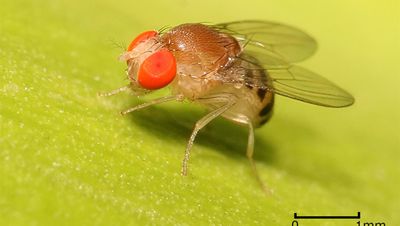Scientists Used Fruit Flies to Quickly Develop a Personalized Cancer Treatment for a Dying Man
Imagine a man with colorectal cancer that has spread throughout his body. His tumor is not responding to traditional chemotherapy. He needs a radically effective treatment as soon as possible and there's no time to wait for a new drug or a new clinical trial.
A plethora of novel combinations of treatments can be screened quickly on as many as 400,000 flies at once.
This was the very real, and terrifying, situation of a recent patient at Mount Sinai Medical Center in New York City. So his doctors turned to a new tactic to speed up the search for a treatment that would save him: Fruit flies.
Yes, fruit flies. Those annoying little buggers that descend on opened food containers are actually leading scientists to fully personalized cancer treatments. Oncology advances often are more about about utilizing old drugs in new combinations than about adding new drugs. But classically, the development of each new chemotherapy drug combination has required studies involving numerous patients spread over many years or decades.
With the fruit fly method, however, a novel treatment -- in the sense that a particular combination of drugs and the timing of their administration has never been used before -- is developed for each patient, almost like on Star Trek, when, faced suddenly with an unknown disease, a futuristic physician researches it and develops a cure quickly enough to save the patient's life.
How It Works
Using genetic engineering techniques, researchers produce a population of fruit fly embryos, each of which is programmed to develop a replica of the patient's cancer.
Since a lot of genetically identical fly embryos can be created, and since they hatch from eggs within 30 hours and then mature within days, a plethora of novel combinations of treatments can be screened quickly on as many as 400,000 flies at once. Then, only the regimens that are effective are administered to the patient.
Biotech entrepreneur Laura Towart, CEO of the UK- and Ireland-based company, My Personal Therapeutics, is partnering with Mount Sinai to develop and test the fruit fly tactic. The researchers recently published a paper demonstrating that the tumor of the man with metastatic colorectal cancer had shrunk considerably following the treatment, and remained stable for 11 months, although he eventually succumbed to his illness.
Open Questions
Cancer is in fact many different diseases, even if it strikes two people in the same place, and both cancers look the same under a microscope. At the level of DNA, RNA, proteins, and other molecular factors, each cancer is unique – and may require a unique treatment approach.
Determining the true impact on cancer mortality will require clinical trials involving many more patients.
"Anatomy of a cancer still plays a major role, if you're a surgeon or radiation oncologist, but the medical approach to cancer therapy is moving toward treatments that are personalized based on other factors," notes Dr. Howard McLeod, an internationally recognized expert on cancer genetics at the Moffitt Cancer Center, in Tampa, Florida. "We are also headed into an era when even the methods for monitoring patients are individualized."
One big unresolved question about the fruit fly screening approach is how effective it will be in terms of actually extending life. Determining the true impact on cancer mortality will require clinical trials involving many more patients.
Next Up
Using machine learning and artificial intelligence, Towart is now working to build a service called TuMatch that will offer rapid and affordable personalized treatment recommendations for all genetically driven cancers. "We hope to have TuMatch available to patients with colorectal/GI cancers by January 2020," she says. "We are also offering [the fruit fly approach] for patients with rare genetic diseases and for patients who are diabetic."
Are Towart's fruit flies the answer to why the man's tumor shrunk? To be sure, the definitive answer will come from further research that is expected soon, but it's also clear that, prior to the treatment, there was nothing left to do for that particular patient. Thus, although it's early in the game, there's a pretty good rationale for optimism.
